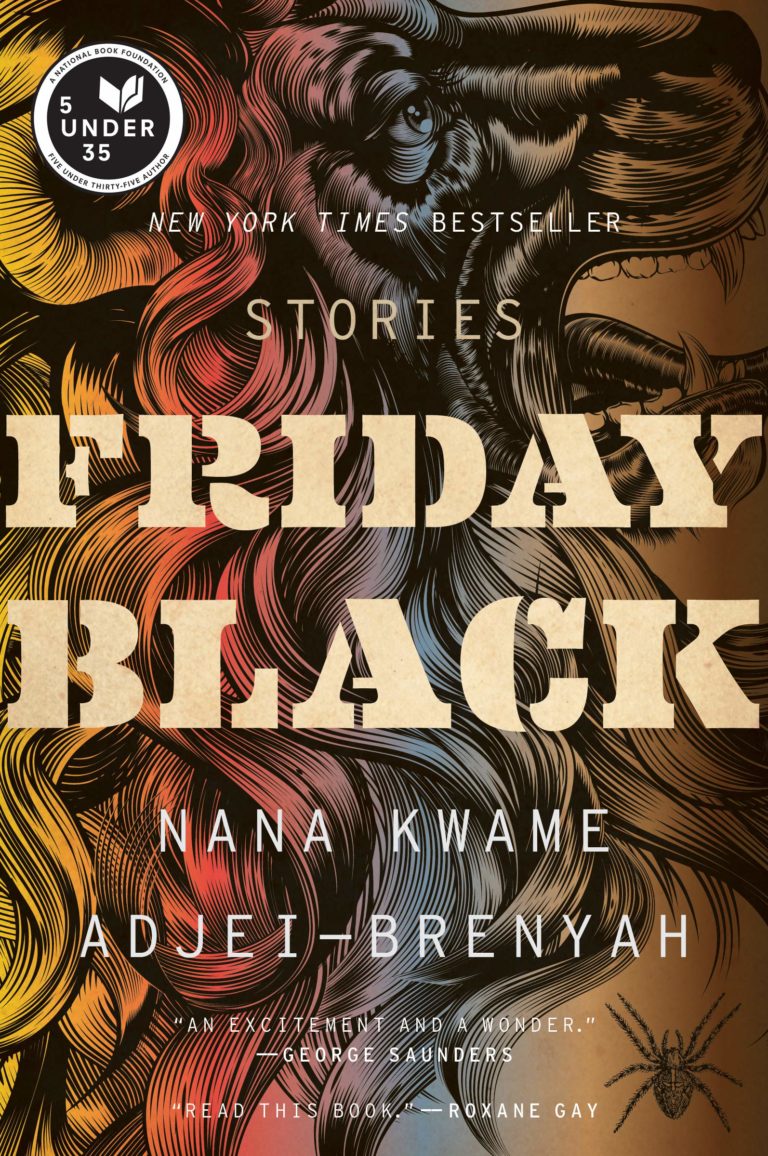There’s a line of thinking that suggests satire is dead, not because our times are too grave, but too bizarre. Reality has out-weirded the artists. Looking at limp current iterations of the old bastions of irony—SNL, The Simpsons et al.—it is hard to disagree, but then something like Friday Black comes along. The debut of Nana Kwame Adjei-Brenyah, the short story collection is satire revitalised, funny and absurd and absolutely furious, its overblown pictures of a near-future America getting closer to the truth than any realism could ever hope.
The collection opens with ‘The Finkelstein 5’, a story that immediately sets out Adjei-Brenyah’s distinctive style—a blend of horror and farce that’s loaded with haunting truth. A white father is on trial for decapitating five black children, The Finkelstein Five, with a chainsaw, though gets acquitted (and deified) due to his appeal to the wholesome family values of the all-American jury. “I did what I had to do,” he says. “And you know what—I loved protecting my kids.”
The story’s narrator Emmanuel Gyan must negotiate this world, his Blackness carefully managed on a scale from 1-10, spiking should he ever swear or shout or wear his cap backwards. A pressed suit and reserved attitude might get him down to a 2.9, while too-baggy jeans might see the needle creep past 5.0 and into dangerous territory. Despite turning the other cheek in the face of racism for the sake of self-preservation, Emmanuel finds himself miss out on a job because of the colour of his skin. “Well, thing is, we have this guy Jamaal here already,” the boss says. “And then there’s also Ty, who’s half-Egyptian. So I mean, it’d be overkill. We aren’t an urban brand.”
Which is how he finds himself dragged into The Naming, a movement quickly labelled a terrorist organisation that sees black people attack whites while chanting the names of the Finkelstein victims. However reluctant Emmanuel might be, the process seems inevitable—violence is coming for him, and he for it, no matter how hard he fights the pull. No amount of Blackness manipulation can save him in the end, and through the act of retribution he realises a perfect 10.0 in the story’s conclusion, before sharply falling to “an absolute nothing point nothing.”
In keeping with the tone of contemporary society, realism and surrealism are intertwined throughout Friday Black, Adjei-Brenyah managing to present a heightened, often speculative world as the perfect representation of our own. The crazed capitalism of Black Friday is taken to its violent extreme, like Dawn of the Dead without the need for Zombie-virus allegory. A man and his father get lost in the Kafkaesque bureaucratic maze of an unfamiliar hospital, a matter complicated by his dealings with a mysterious “Twelve-tongued God” that has placed a magical brand on his back. Aborted fetuses return to talk with their father, riding in his pocket as they visit their mother’s fortune teller. Post-apocalyptic teachers discuss the Big Long War and the Big Quick War and swear to complete sincerity to avoid any repeat, even if it involves telling ugly kids they are ugly and stupid kids they are stupid. Adjei-Brenyah keeps going and going, his imagination outdoing itself in conjuring unbelievable situations that carry portentous weight, or else a sense of déjà vu.
The George Saunders vibes are at the forefront of ‘Zimmer Land’, a story that sees all of Adjei-Brenyah’s key themes intersect. It imagines a commercial role-play experience which allows people to experience danger and violence without any actual danger and violence. Perhaps unsurprisingly, this allows users to act out their base desires, exposing the racial hatred that has existed at the core of the Western World for time immemorial (the title doesn’t take a lot of parsing in this context). Isaiah gets shot for a living by sanctimonious white men; men addicted to the rush and the blood and the moralising of their crimes, men making victims of themselves with Godly certainty, covered in the blood of other men.
The final story is like Groundhog Day meets Threads meets Battle Royale, taking the bloodthirsty insanity of living the same day over and over at the culmination of nuclear war and somehow giving it a quiet humanity. The feat is something of an Adjei-Brenyah trademark, his ability to breathe souls into his characters despite their darkly ridiculous surroundings quite possibly his greatest strength.
Through its peculiar blend of horror, sci-fi and satire, Friday Black presents America as caught in a funhouse mirror—fear and fury and fully-righteous greed brought into relief and magnified into hideous detail. Still, no matter how exaggerated and distorted the reflection, its eyes are always staring back, as cold and star-spangled as ever. Adjei-Brenyah is undeterred, staring right back with an unflinching gaze, all the while grasping for anything that might represent a human heart that still exists within the monster ahead of him.
Friday Black is out now via Houghton Mifflin Harcourt imprint, Mariner Books.

